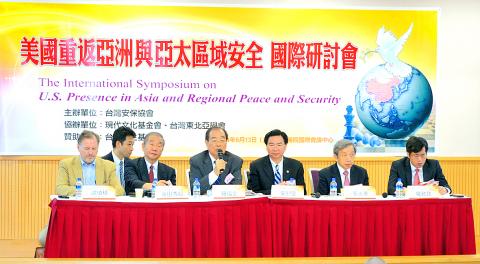|
Academics slam US experts’ maritime ideas
‘ABOUT CHINA’: A former US State Department official said that Washington’s ‘pivot to Asia’ should principally be aimed toward offsetting Chinese hegemony in the region
By Alison Hsiao / Staff reporter

Taiwan National Security Institute chairman Lo Fu-chen, center, speaks at an international symposium titled US Presence in Asia and Regional Peace and Security at the National Taiwan University Hospital International Convention Center in Taipei yesterday.
Photo: Wang Min-wei, Taipei Times
US analysts called on Taiwan to base its territorial claims in the South China Sea on international law and emphasized the nation’s likely role as a “balancer” in the US’ “pivot” toward Asia when facing Chinese hegemony, while Taiwanese academics said US policies regarding Taiwan and the pivot are “contradictory,” and its close alliance with China “blind” and naive.
At an international symposium titled “US presence in Asia and Regional Peace and Security” organized by the Taiwan National Security Institute in Taipei yesterday, former American Institute in Taiwan (AIT) director William Stanton called on the nation to abandon the “nine-dash line” according to which Taiwan claims the entire South China Sea. China also uses the nine-dash line for its territorial claims in the region.
“Taiwan has already provided an ideal model of how the Asian neighbors should interact in their negotiated settlements of fishing disputes with Japan and the Philippines. Taiwan should again lead the way by basing its claims to South China Sea territories on international law rather than on the Republic of China’s unexplained 1947 nine-dash map [published when the Republic of China had not yet retreated to Taiwan],” Stanton said.
The 1982 UN Convention on the Law of the Sea is “a reasonable basis that everybody agrees on, except for China and Taiwan. The nine-dash line is [something] somebody sketched out and just said: It’s all ours. Taiwan, not a member of the UN, always says how it abides by international conventions,” he added. “I would like to see Taiwan again get out front and say, ‘we’re abiding by international law.’ And I don’t think from a practical point of view it would affect [its] interests.”
When told that such a change might require an amendment to the Constitution, Stanton acknowledged the difficulty, but said it is his job as a critic to say that this is what Taiwan ought to do.
“Whether practically you can do it or not is a different question,” he added.
A former US Department of State official said at the symposium that it would leave the US and other Asian neighbors wondering whether there exists “a potential Beijing-Taipei maritime axis” after “the Taipei government repeatedly supported Beijing” throughout the frictions between China and South East Asian countries over the South China Sea by claiming that the islands are “Chinese.”
“It doesn’t take a lot of sophisticated analysis to conclude that, if Taiwan is not part of the ‘pivot,’ then the ‘pivot’ will not work,” said John Tkacik, former Chief of China Analysis in the department’s Bureau of Intelligence and Research.
Tkacik said that to be successful, the US’ pivot should be a balancing strategy against an adversary that has “hegemonic aspirations.”
Both US specialists underscored Taiwan’s strategic role in the US pivot, which is “principally about China.”
As “America’s pivot presupposed solid encouragement and military/naval coordination with its partners in Asia,” Washington could not afford to disregard contributions from Taiwan, one of its security partners in Asia, when “China’s obvious strategy now is to undermine America’s alliances across Asia,” Tkacik said.
Stanton, while saying that views of the nation as “uniquely poised to be an important partner in the security component of [the pivot]” are accurate, added that the ideas are “unlikely to be implemented given current self-imposed constraints in both Taiwan and the US.”
Taiwanese academics expressed concern over the “self-imposed constraints.”
Former National Security Council deputy secretary-general Parris Chang (張旭成) said the US has failed to distinguish between friends and enemies and ignored that the aim of the pivot is to counter China with an alliance between the US and Asian partners.
“[The US government] has blindly endorsed the implementation of Chinese President Xi Jinping’s (習近平) ‘new model of great powers relations,’ and has turned a blind eye to Beijing’s intention to change the Asia-Pacific order and rules of the game,” Chang said. “The US has no understanding of Chinese leaders’ idea of a great power and strategic thinking.”
Chang also added that President Ma Ying-jeou (馬英九) administration’s pro-China stance has led to his “lack of care for Taiwan’s defense.”
Taiwan Thinktank deputy executive director Lai I-chung (賴怡忠) said the US’ call for Taiwan to give up its South China Sea claims on the one hand and its insistence on the “one China” policy on the other is “contradictory.”
“China’s territorial claims in the East and South China seas are based on its claims to own Taiwan. If China does not own Taiwan, its claims over the Diaoyutai (釣魚台) and Spratly (Nansha, 南沙群島) island chains would be untenable,” Lai said, adding that the US’ “one China” policy, its warning against Taiwan antagonizing Beijing and its hesitation to integrate Taiwan into a China free economic network have all pushed the nation away from its proclaimed rebalancing strategy.
Soochow University political science associate professor Lo Chih-cheng (羅致政) said the US has been encouraging Taipei’s economic dependence on China, but now, as former US secretary of state Hillary Rodham Clinton said, sees that the economic dependence might cost the nation its political independence.
source: Taipei Times
|